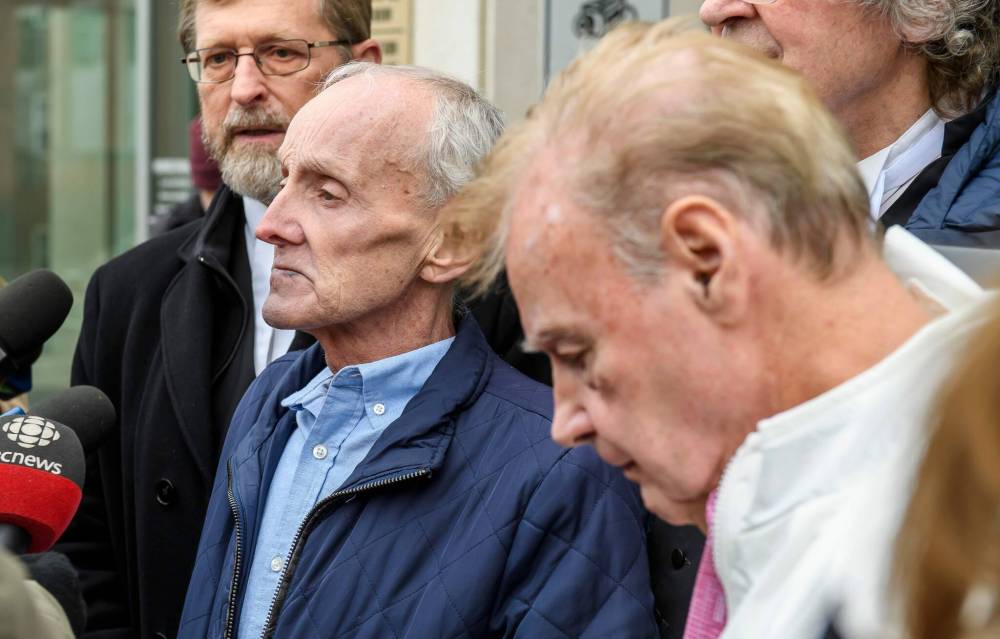Wrongful convictions deserve public inquiry
Advertisement
Read this article for free:
or
Already have an account? Log in here »
To continue reading, please subscribe:
Monthly Digital Subscription
$0 for the first 4 weeks*
- Enjoy unlimited reading on winnipegfreepress.com
- Read the E-Edition, our digital replica newspaper
- Access News Break, our award-winning app
- Play interactive puzzles
*No charge for 4 weeks then price increases to the regular rate of $19.00 plus GST every four weeks. Offer available to new and qualified returning subscribers only. Cancel any time.
Monthly Digital Subscription
$4.75/week*
- Enjoy unlimited reading on winnipegfreepress.com
- Read the E-Edition, our digital replica newspaper
- Access News Break, our award-winning app
- Play interactive puzzles
*Billed as $19 plus GST every four weeks. Cancel any time.
To continue reading, please subscribe:
Add Free Press access to your Brandon Sun subscription for only an additional
$1 for the first 4 weeks*
*Your next subscription payment will increase by $1.00 and you will be charged $16.99 plus GST for four weeks. After four weeks, your payment will increase to $23.99 plus GST every four weeks.
Read unlimited articles for free today:
or
Already have an account? Log in here »
Hey there, time traveller!
This article was published 09/01/2024 (722 days ago), so information in it may no longer be current.
If you don’t find it unsettling, you should.
In the Jan. 6 edition of the Free Press, there was a story out of New Brunswick about the wrongful convictions of two men in 1984. Robert Mailman and Walter Gillespie went to jail for the murder of John Leeman, even though Saint John police had confirmed parts of their alibis for the time of the murder.
Innocence Canada lawyers, in a written submission, pointed out that, along with disregarding the men’s alibis, “police tunnel vision, the non-disclosure of important evidence, (and) recantations by the two key Crown witnesses” were key to the men’s convictions. Mailman, 76, spent 18 years in prison; he’s now battling terminal liver cancer. Gillespie, 80, served 21 years.

Michael Hawkins / the Canadian Press Files
Robert Mailman, left, and Walter Gillespie.
The personal cost to the two men is obvious: Mailman’s “greatest wish was to have his conviction overturned before he died.” The Innocence Canada submission said he has no contact with his family, because he “never wanted them to be embarrassed by their association with a convicted killer … He no longer visits either of his sons’ gravesites because previous visits resulted in them being vandalized.”
“Most of his immediate family died in a house fire when Mr. Gillespie was only 20 years old,” the submission said. He has a daughter, but “he lost a relationship with his only child because of the years he spent in prison.”
It all sounds eerily familiar. And it should. Innocence Canada lists more than two dozen exonerations of wrongly convicted Canadians on its website, and more cases get added to the total every year.
Among the most recent? The convictions of Allan John (A.J.) Woodhouse and Brian Anderson, two of the four Indigenous men convicted in the 1973 slaying of Ting Fong Chan, 40, in Winnipeg. Innocence Canada also believes the two other men convicted in the slaying, Clarence Woodhouse and Russell Woodhouse, could also be exonerated.
One of the most troubling aspects of the case is that the men were alleged to have signed statements in English, despite not having a grasp of the language. They were, at the time of their arrest, newly arrived in Winnipeg from the Pinaymootang First Nation and spoke Ojibwa.
“Clarence Woodhouse is alleged to have given a statement to police that is in good English; that is written in sentences … None of the men had interpreters,” Innocence Canada lawyer Jerome Kennedy said. “When Clarence Woodhouse testified at trial … he didn’t understand the language.”
It’s part of a troubling pattern. The former Crown prosecutor who handled the Chan slaying file, George Dangerfield, has been linked to other wrongful convictions, including those of Thomas Sophonow, James Driskell, Kyle Unger and Frank Ostrowski.
But even more troubling is that the pattern isn’t restricted to one prosecutor or one police force — or even to one city or one province.
It seems abundantly clear that miscarriages of justice have taken place pretty much right across this country, and that police forces and provincial justice officials have a disturbing record of finding a way to convict people they believe to be guilty of serious crimes — even if the evidence doesn’t match their preconceived opinions.
That means that innocent Canadians can lose huge parts of their lives as punishment for crimes they didn’t commit.
It’s not acceptable conduct in even one single case.
But as the numbers climb, and as Innocence Canada continues to fight for the wrongly convicted, it seems more and more as though police and prosecutors acted with a kind of impunity that requires a full public examination.
It’s not enough to say, “Oh, well, we got one wrong” and just suggest that there’s nothing to see here and everyone should move along.




